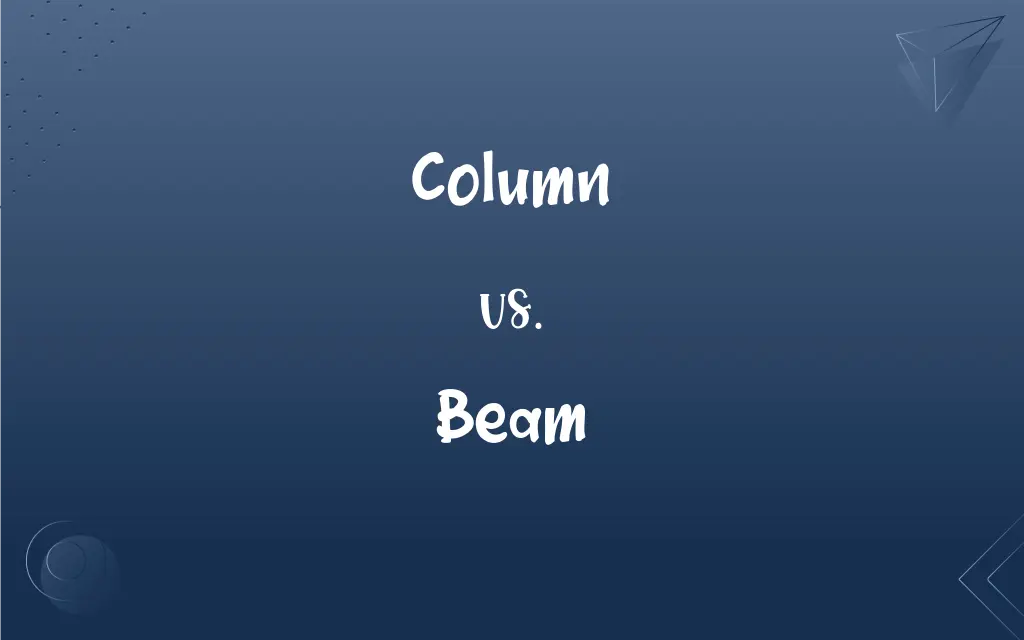Column vs. Beam: What's the Difference?
Edited by Aimie Carlson || By Harlon Moss || Updated on October 3, 2023
A column is a vertical structural member bearing axial loads, while a beam is a horizontal member resisting lateral loads.

Key Differences
Both column and beam are integral elements in the field of structural engineering and architecture. A column typically supports loads vertically, acting as the mainstay for structures above, while a beam primarily disperses loads horizontally across its length.
Columns often serve as foundational units for beams, holding them in place. They can be round, square, or designed in various intricate shapes. On the contrary, beams are linear, spanning across columns or walls, serving as the backbone for floors and roofs.
In terms of materials, both columns and beams can be constructed from a variety of substances including wood, steel, concrete, or a composite combination. Regardless of the material, a column's primary function remains axial load-bearing, while a beam's focus is on resisting bending and shear forces.
Columns are more associated with compressive stresses due to the vertical loads they bear. Beams, however, manage both compressive and tensile stresses, the former on the top (in simply supported beams) and the latter on the bottom due to bending.
It's crucial for engineers and architects to accurately calculate the load-bearing capacities of columns and the bending resistances of beams. These calculations ensure the stability and safety of the structures they design, with columns and beams acting in tandem to hold structures aloft.
ADVERTISEMENT
Comparison Chart
Structural Role
Vertical load-bearer
Horizontal load distributor
Orientation
Typically vertical
Typically horizontal
Stress Type
Mainly compressive
Both compressive and tensile
Connection with Other Element
Often supports beams
Often spans between columns or walls
Usage in Sentence
Often as a noun (e.g., a concrete column).
Typically as a noun (e.g., a steel beam).
ADVERTISEMENT
Column and Beam Definitions
Column
A vertical architectural piece supporting weight.
The ancient ruins featured towering stone columns.
Beam
The main horizontal support of a structure.
The exposed beams in the ceiling were a design feature.
Column
A structural member that stands to bear loads.
Each column in the hall was carefully crafted.
Beam
A linear member supporting weight across its length.
Engineers ensured the beam could handle the room's weight.
Column
A cylindrical vertical support in structures.
The building's facade was adorned with ornate columns.
Beam
A load-bearing line of material in construction.
Sunlight streamed between the barn's old beams.
Column
A vertical shaft that can be load-bearing or decorative.
The house had a columned porch which added to its charm.
Beam
A rigid rod or bar that disperses forces horizontally.
The house's open concept was possible due to the steel beams.
Column
A pillar used for decorative or structural purposes.
Marble columns enhanced the entrance's grandeur.
Beam
A horizontal structural element that bears loads.
The wooden beam overhead added a rustic touch.
Column
A vertical structure usually consisting of a base, a cylindrical shaft, and a capital, used as a support or standing alone as a monument.
Beam
A squared-off log or a large, oblong piece of timber, metal, or stone used especially as a horizontal support in construction.
Column
Any slender vertical support, as of steel or reinforced concrete.
Beam
A transverse structural member of a ship's frame, used to support a deck and to brace the sides against stress.
Column
Something resembling an architectural column in form or function
A column of mercury in a thermometer.
Beam
The breadth of a ship at the widest point.
Column
One of two or more vertical sections of text lying side by side in a document and separated by a rule or a blank space.
Beam
The side of a ship
Sighted land off the starboard beam.
FAQs
What are the primary functions of a column and beam in construction?
A column primarily supports vertical loads, while a beam disperses loads horizontally.
Can beams be curved?
Yes, beams can be curved, often seen in bridges or architectural designs.
Which experiences more bending, a column or a beam?
A beam typically experiences more bending due to lateral loads.
Are columns solely for indoor use?
No, columns can be both interior and exterior, supporting structures like porches or overhangs.
How do architects decide the thickness of a column or width of a beam?
It's based on load calculations, material strength, and safety factors.
What is the main stress in a beam when it bends?
Beams experience both compressive stress (top) and tensile stress (bottom) when bending.
Why are some beams exposed in design?
Exposed beams can be an aesthetic choice, giving a rustic or industrial look.
Which materials are commonly used for columns and beams?
Common materials include wood, steel, concrete, and composites.
Can a beam function as a column?
While both bear loads, they are designed for specific orientations and stresses. Using one for the other's role can be risky.
Can a column be horizontal in orientation?
While traditionally vertical, in modern design, "column" can sometimes refer to horizontal members, but it's rare.
Is a pillar the same as a column?
While similar and often used interchangeably, a pillar is generally for decorative purposes, whereas a column is structural.
Can columns be hollow?
Yes, some columns, especially those for decorative purposes, can be hollow.
Is a column's design purely functional?
While function is primary, columns can also have aesthetic designs, especially in classical architecture.
How do beams connect to columns?
Connections can be bolted, welded, or riveted, depending on design and material.
What happens if a column fails?
Column failure can lead to a partial or complete collapse of the structure it supports.
Which is more critical in a building, a column or a beam?
Both are vital, with columns supporting vertically and beams dispersing lateral loads.
Do beams always rest on columns?
While beams often rest on columns, they can also span between walls or other structural elements.
Are all beams straight?
While most beams are straight, they can also be curved or shaped as required by design.
Can you have a building without beams?
It's rare, as beams are primary horizontal supports. However, some designs may utilize other structural systems.
Are the terms "column" and "beam" used outside of construction?
Yes, they can refer to elements in data tables (column) or light rays (beam), among other uses.
About Author
Written by
Harlon MossHarlon is a seasoned quality moderator and accomplished content writer for Difference Wiki. An alumnus of the prestigious University of California, he earned his degree in Computer Science. Leveraging his academic background, Harlon brings a meticulous and informed perspective to his work, ensuring content accuracy and excellence.
Edited by
Aimie CarlsonAimie Carlson, holding a master's degree in English literature, is a fervent English language enthusiast. She lends her writing talents to Difference Wiki, a prominent website that specializes in comparisons, offering readers insightful analyses that both captivate and inform.






























































